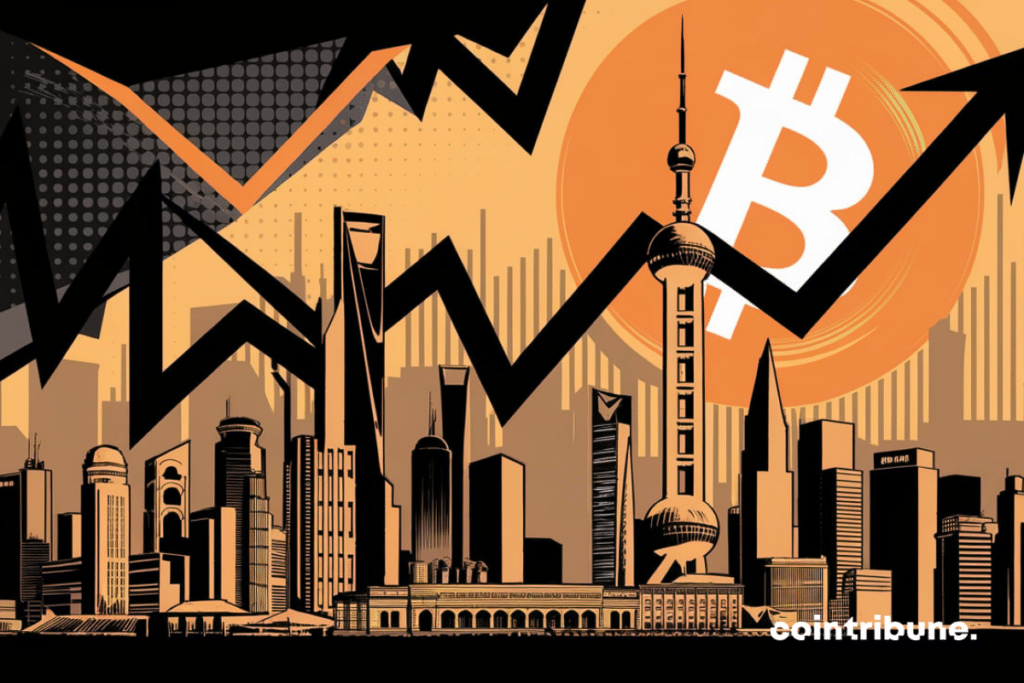🚨LATEST: Money printer goes brrrrr in 🇨🇳 pic.twitter.com/CyR3cZmoh9
— Simply Bitcoin (@SimplyBitcoinTV) September 24, 2024
A
A
China Is Printing in turn
Wed 25 Sep 2024 ▪
6
min read ▪ by
Getting informed
▪
Investissement
After the ECB and the Fed, it’s the turn of China’s central bank to significantly ease its monetary policy. What impact on the stock market and bitcoin?

The PBoC Mimics the Fed
The Chinese central bank didn’t take long to react after the Fed reduced its key rate by 0.50%, bringing it down to 4.75%.
The People’s Bank of China responded by lowering its key rate by 0.20%, from 1.7% to 1.5%. That’s twice the usual cuts of 0.10%. This is the sixth cut since March 2020, when the rate was at 2.4%.
Most notably, the PBoC has trimmed the reserve requirement ratio, bringing it to its lowest since 2018. Simply put, banks will be able to create more money ex nihilo relative to their reserves.
It’s the first time since 2015 that reductions in these two monetary parameters have been announced in tandem.
As a consequence, the yield on Chinese 10-year government bonds has fallen to 2%, a historic low. The US government borrows at 3.70%, and France at 2.90%.
This monetary easing should allow China to issue at least 10 trillion yuan ($1.42 trillion) in very long-term government bonds. Compare that to the annual government budget, which is equivalent to $4 trillion.
These borrowings will be made over the next two years, said Liu Shijin, former deputy director of the Development Research Center of the State Council, China’s top executive body.
China can afford it. Inflation has been virtually nonexistent for over a year. Conversely, it remains to be seen whether Western monetary easing will rekindle inflation…
The Chinese Stock Market Rebounds
Chinese stock markets have been sluggish for years, weighed down by the risk of Western sanctions and the real estate crisis.
However, it is important to differentiate the current situation from the 2008 US financial crisis. The problems have mostly concentrated on real estate developers rather than individual defaults. The Chinese banking system hasn’t been shaken.
Nevertheless, Chinese stock markets have lost the equivalent of $6 trillion in market capitalization over nearly four years. The Shanghai Stock Exchange was down 7% before the PBoC announcements.
After drops of -10%, -8%, and -15% in the Hang Seng, Shanghai Composite, and Shenzhen Component indices at the beginning of the year, we are now at +14%, -2%, and -9% respectively.
Here’s the evolution of the index of the fifty largest Chinese companies since September 11:
This rebound is due to the fact that investment funds and insurance companies will be able to tap into PBoC funds to buy stocks. We’re talking about approximately 800 billion yuan ($113 billion).
Enough to support valuations that are at a 10-year low. The price-earnings ratio of the Shanghai Stock Exchange is at its lowest since late 2014. According to Morningstar, Chinese stocks are undervalued by 31%.
Is this enough to attract capital from petro-monarchies and other nations looking to reduce their exposure to Western nations? The specter of the freezing of $300 billion in Russian foreign exchange reserves still looms large…
That said, caution will remain as long as geopolitical tensions are high. Threats of killer tariffs from Donald Trump will maintain uncertainty.
Monetary Easing Bodes Well for Bitcoin
Granted, exchanges are banned in China. You can’t go to a site like Coinbase or Binance to buy bitcoins. In-person meetings are necessary. “Under the table” bitcoin sales are on the rise in Hong Kong.
These draconian laws have slowed bitcoin adoption, putting China in the twentieth position globally according to Chainalysis, which is not typical for the country. According to their 2024 report, South Korea has bought as many bitcoins as China despite having a population 33 times smaller.
The launch of Bitcoin ETFs in Hong Kong suggests that things are slowly moving in the right direction. But for now, the Chinese government has little appetite for what it sees as speculation and a way to bypass its capital controls.
Unfortunately, Xi Jinping’s government still refuses to see bitcoin as the next international reserve currency. It clings to gold even though bitcoin is vastly superior in every way.
Perhaps things will change when China further opens its capital markets to avoid being excluded from European and American markets.
Meanwhile, global monetary easing bodes well for asset prices, especially bitcoin. Don’t miss our article: Bitcoin – The four pillars of the next Bull Run.
Maximize your Cointribune experience with our "Read to Earn" program! For every article you read, earn points and access exclusive rewards. Sign up now and start earning benefits.
A
A
Bitcoin, geopolitical, economic and energy journalist.
DISCLAIMER
The views, thoughts, and opinions expressed in this article belong solely to the author, and should not be taken as investment advice. Do your own research before taking any investment decisions.